Culture shock can be described as a state of confusion and disorientation, that can be physical or psychological, and it is caused when someone moves from a familiar culture to an unfamiliar one (Troy Segal, Investopedia, 2025).
Term was coined by an anthropologist Kalervo Oberg in 1950s:
Culture shock is precipitated by the anxiety that results from losing all our familiar signs and symbols of social intercourse. These signs or cues include the thousand and one ways in which we orient ourselves to the situations of daily life: when to shake hands, what to say when we meet people, when and how to give tips.
Oberg theorised that are four stages of culture shock:
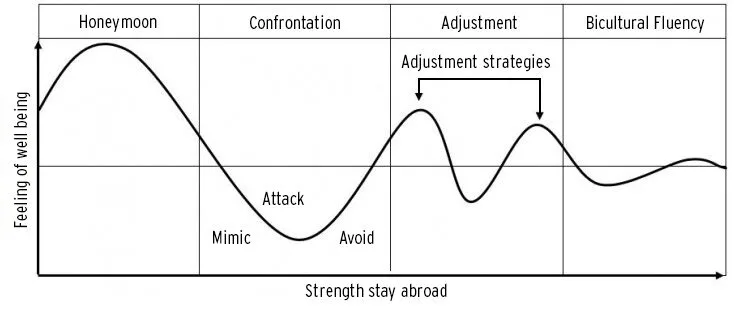
However, individuals experience a wide range of emotions related to relocation.
Culture shock can happen to anyone moving to a new place, even if only temporarily. Some people adapt easier than others, but it also depends on how different your new home is to your old one.
Moving between countries that are geographically close to each other usually entails less of a culture shock, as due to some factors such as similar weather and timezones, routines may also be more similar. Other aspects, such as traditions, norms, and values, may still greatly differ.
Therefore, it isn’t only about the person moving, but also the places they are moving between. Typically, the further you go, the greater the differences in culture.
Cultural awareness involves recognising one’s own cultural influences while also understanding the cultural values, beliefs, and practices of others. It goes beyond mere acknowledgment; it requires an active effort to appreciate and engage with different cultures in a respectful and informed manner ... (The Oxford Review).
Cultural awareness is the recognition and understanding of both similarities and differences between different cultures.
It is an important part of adapting to a new country.
One of the most important aspects of cultural awareness in regards to dealing with culture shock, is the respect and acceptance of the differences.
By immersing yourself into the country’s culture, and trying to adapt your lifestyle to this one, you will find that it will be easier to adapt, as you’ll be less likely to feel like someone who doesn’t belong in that place.
Visiting a country as an intern is very different to visiting a country as a tourist for a number of reasons.
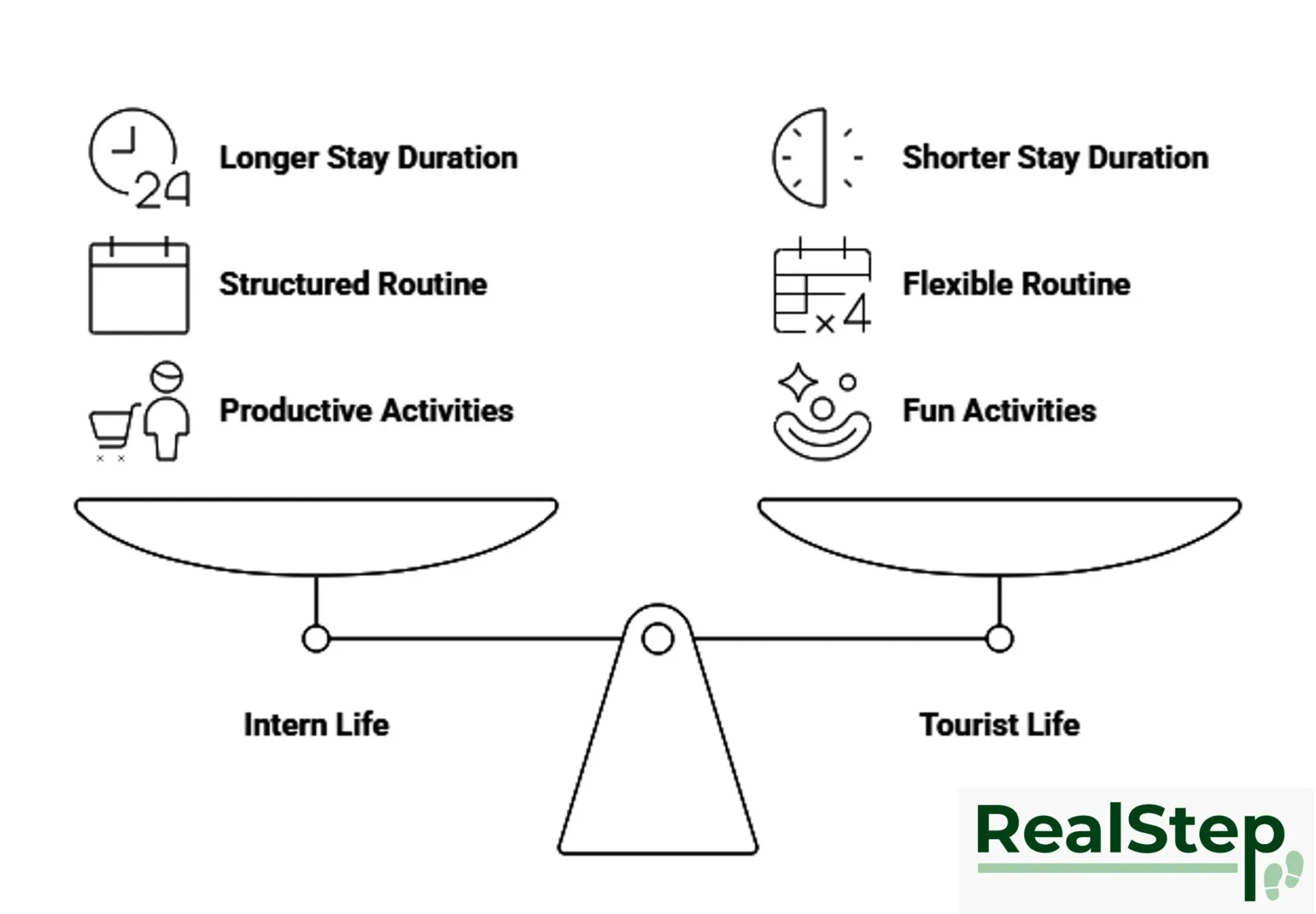
The amount of time both will spend in the country.
Tourists tend to stay in one place for a few days, sometimes just one, and other times up to over a week. Interns on the other hand, are usually in for a longer stay. In some rare cases, the intern could stay for about two weeks, however they tend to be for a minimum of one month.
The routine.
Interns are somewhat more restricted because of their working hours. They must be on site for 35 hours/week for example, and a lot of the extra time is also used for other productive purposes - grocery shopping, cooking, cleaning, exercise.
Tourists have a free schedule.
Even if they choose to take part in activities, cook, or even exercise, they do it at the time they want to, with no restrictions besides the ones they set themselves.
The reason this has an impact is because when travelling to a country as a tourist, there is the opportunity to take part in only ‘fun’ activities, meaning they tend to see life in that city through rose-colored glasses.
The unknown can be scary, understandably so, especially at such a large scale, such as moving abroad.
However, it is also the perfect opportunity for personal growth (see testimonials section).
If you are looking to gain new experiences, meet new people, and discover the world, you inevitably have to leave your comfort zone.
Culture shock is a temporary effect of interning abroad, and it doesn’t have a specific timeline.
This means if you take the right steps to navigate cultural differences, adapting yourself to a new country may be easier than you’d imagine.
Most of it ends up being about how you react to these differences, which is why we’re going to look at how to do so.
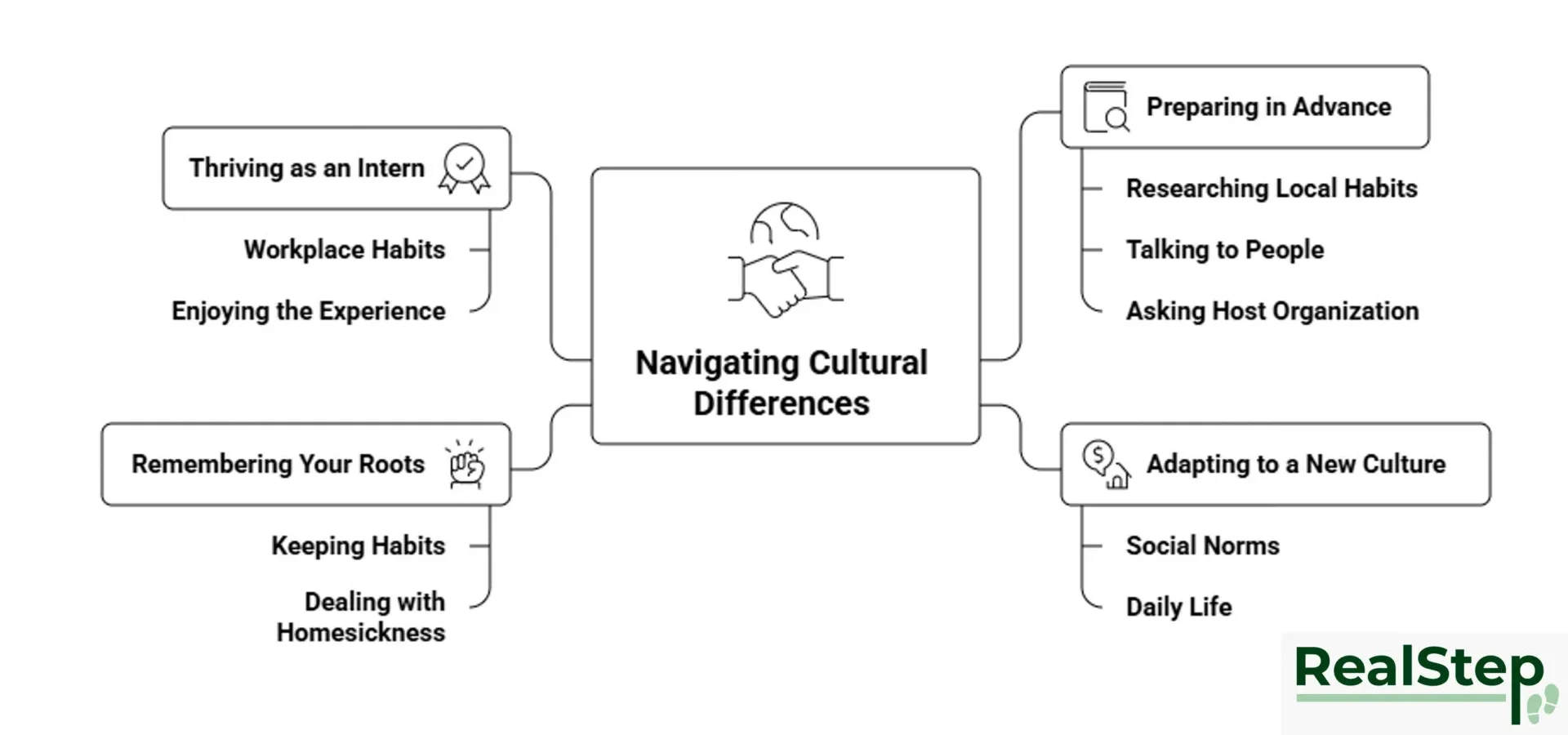
If the right steps are taken, the effects of cultural shock can be minimized. This will make adapting to a new place much easier, and allow you to enjoy your time with less worries.
While you are not yet in the country of your internship, you have to work with the resources you have available to you at the moment.
Researching about local habits and lifestyle can go a long way.
These include social norms, workplace habits, and most importantly daily life.
Transportation, mealtimes, daily costs, and store opening times are small details that end up being significant when all added together.
Talking to people you know about their experiences abroad is also very helpful.
Having first hand insight into someone’s encounters is a great way to discover what life abroad can really look like.
However if you do this, do be mindful of the fact that everybody has different experiences and ways to adapt. What works for one does not necessarily work for all.
If the internship you are undertaking is curricular, ask your host organization for more information on the country.
It is very unlikely that you are their first student interning in that place.
This means they may also have other students’ experiences to share with you, and if that isn’t the case they might still have a guide for said country.
Diving into the aspect of local habits and lifestyle - it’s one thing to know them, and another to immerse yourself into them.
Social norms will be important when it comes to meeting new people.
Knowing how they greet, how they feel about personal space, and just general etiquette when it comes to going out, can go a long way in making good first impressions.
Regarding daily life, you need to be prepared for the likely possibility that things won’t be the same as they are at home. If you are used to driving around places, be ready to take public transportation.
If you tend to do your grocery shopping or go to the mall on Sundays, understand that in some places these are closed on this same day.
If you want to go out for meals, but are used to eating at a specific time, be aware that restaurants may open later or close earlier than you are used to.
It is important to keep habits from back home, especially those that make you feel good. Activities such as journaling, exercising, reading - these are all healthy habits that you should not let be affected by moving to a new place.
The most difficult part about having a routine is starting it, therefore use the one you already have and work around it, rather than starting from zero.
Living and interning abroad also likely means that you will feel homesick sometimes, which is completely normal, especially if you decide to intern in a country with a very different culture and lifestyle to the one you are used to. For this it might be good to do what makes you feel at home.
Bring small memorabilia with you, eat meals you would eat at home, or even call someone from back home - family or friends.
What makes a successful internship is usually a combination of factors. Enjoying the work that is undertaken, making connections in the field of your choice, and it being a learning experience. Some factors may be less important than others, depending on your personal goals.
Workplace habits will help make your integration in the company easier. Be punctual, understand what their meaning of breaks are, if you have the opportunity to have lunch with your colleagues, do it.
Yes, your internship is supposed to be a learning experience, but it is also important to enjoy it, and getting along with the people you work with is already a great way to get started.
RealStep offers numerous internship programs in Europe. Here are a couple testimonials from people that found their internship through RealStep, in order to give you a first-hand story on how things played out for these interns. Maybe you could be the next one!
On a personal level, this project has enabled me to feel useful within society and in the protection of endangered species, but also to meet people from all over the world and visit an area rich in biodiversity.
Discover how Clara’s experiences went!
The project also gave me a lot of personal satisfaction: I met a lot of people, improved my English and my openness to others, and learned to live in a community.
Discover how Chloé’s experiences went!
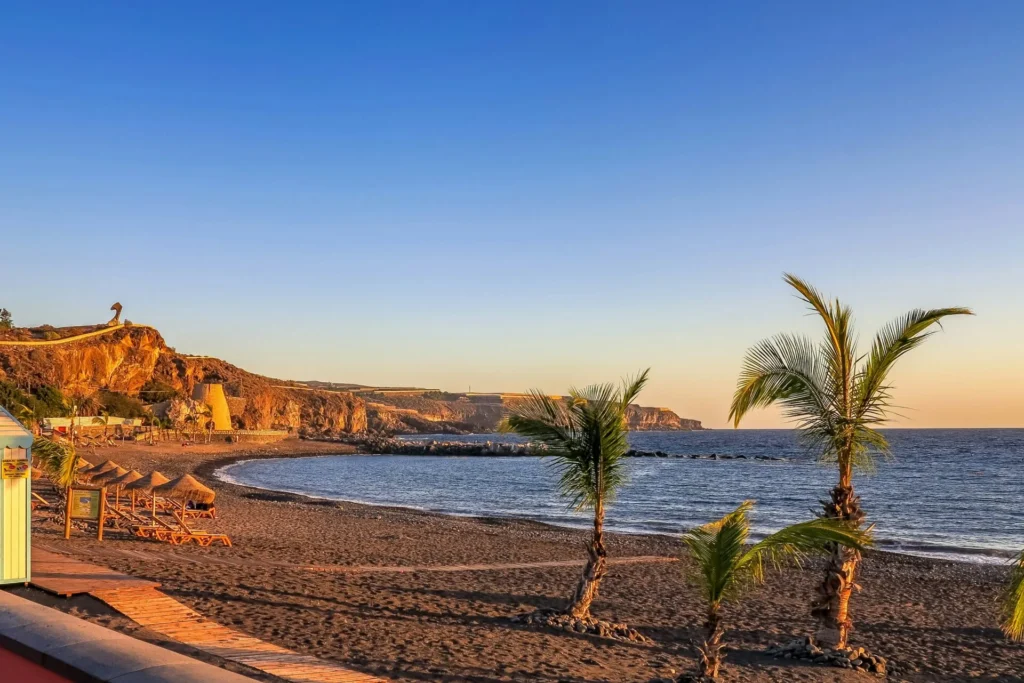
Find out more about the program here.
This internship allowed me to grow in a very different environment from what I had experienced so far. I discovered a professional world where people are at the center of everything. What struck me the most was the richness of exchanges with my colleagues, all from very diverse backgrounds. It was a deeply fulfilling experience.
Discover how Quentin’s experience went!

Find out more about the program here.
RealStep also offers multiple internships in Asia. Compared to Europe, most of these are related to medicine and nursing, and environmental conservation. However, there is also the possibility to undertake business, communication, IT and engineering internships. Check out a couple of options as well as experiences previous interns have shared!
On a professional level, I learned new care techniques, sometimes very different from those practiced in France. The relational approach with patients and their families particularly touched me: here, the family plays a central role in care, much more than we see at home.
Discover how Lucie’s experience went!
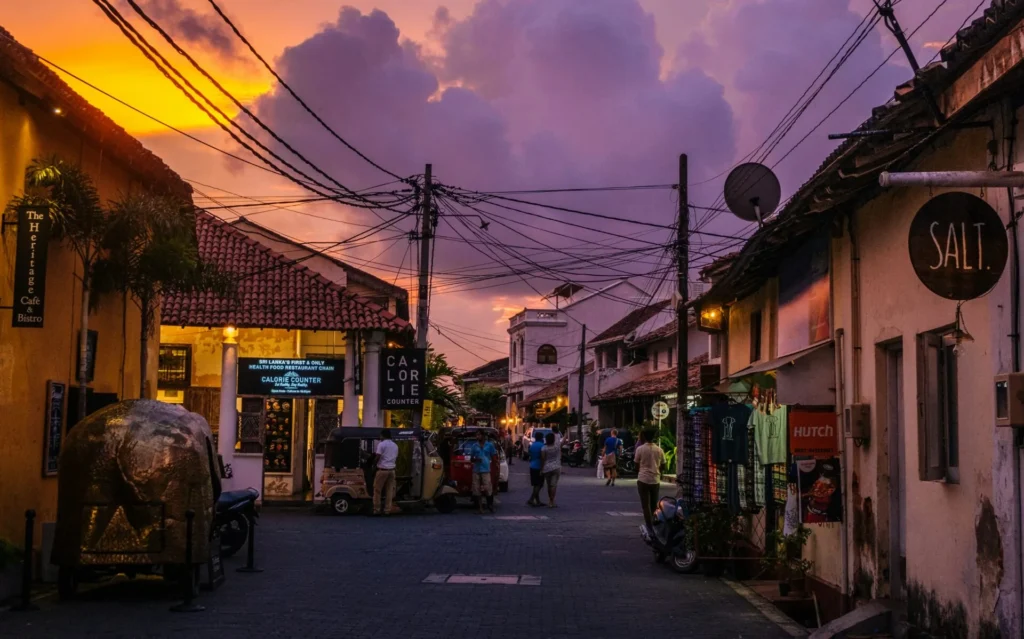
Find out more about the program here.
The internship enabled me to put into practice what I'd learned in class, while discovering a culture and way of life very different from my own. These exchanges were enriching and gave me a new perspective, both professionally and personally.
Discover how Claire’s experience went!
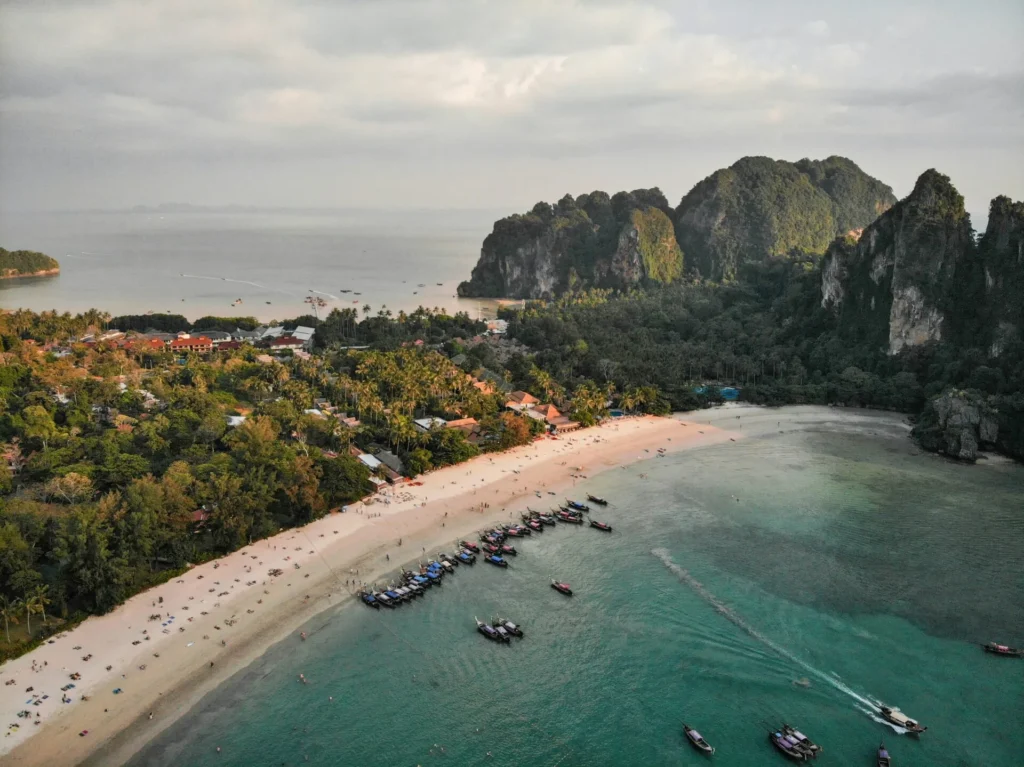
Find out more about the program here.
RealStep offers the possibility to participate in internships in Africa as well. Similarly to Asia, there is a greater focus on medicine and nursing as well as environmental preservation. Here are some options for you to consider, as well as testimonials from students who have interned with RealStep.
This internship was a real eye-opener. It helped me better understand the differences between healthcare systems, broadening my perspective on nursing and gaining adaptability. A memorable experience both personally and professionally.
Discover how Lou’s experience went!
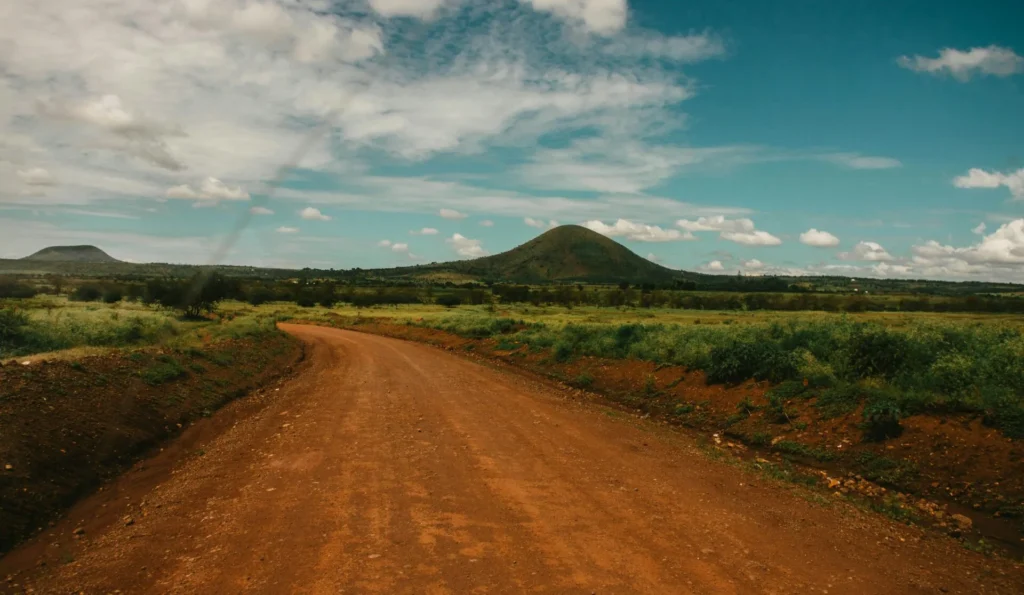
Find out more about the program here.
On a personal level, this internship enabled me to discover the bush environment and realize one of my dreams: to see the Big 5. It was also an opportunity for me to meet interns from all over the world, to live in the bush, and to make new acquaintances, enabling me to improve my English.
Discover how Laura’s experience went!

Find out more about the program here.
Did you like this article ?
Share it on social media!
In this article :
Similar items
Our latest articles


